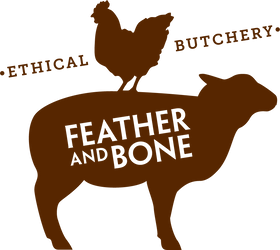Ecocentricity and one farm's work to protect biodiversity
“The health of ecosystems on which we and all other species depend is deteriorating more rapidly than ever. We are eroding the very foundations of our economies, livelihoods, food security, health and quality of life worldwide.”
Sir Robert Watson, IPBES Chair
Yesterday, the UN's IPBES (The Intergovernmental Science-Policy Platform on Biodiversity and Ecosystem Services) released the important Global Assessment Report on Biodiversity and Ecosystem Services. This is the first such intergovernmental report and it provides damning evidence that human behaviour is causing a spiralling crisis of declining biodiversity which, if it continues unchecked, spells dire consequences for our planet's future. Essentially, our riotous success as the peak predator has led us to lose sight of the fact that we are simply one among many interdependent creatures living together in mind-bogglingly complex ecosystems.
It's hard to get your head around the scale of the problem and the statistics in the report are deeply distressing, but it's not exactly a surprise. We don't need to tell you that it's this egocentric rather than ecocentric attitude that allows us to justify all sorts of perverse and destructive behaviour in the name of Progress. When it comes to food, the costs of industrial production are exorbitant and it’s a price we are all forced to pay.
We can't undo much of the damage and we can't bring back extinct species. But we can slow or prevent the loss of others. The report makes no bones about the fact that our survival is clearly predicated on our capacity to change our behaviour, immediately and everywhere. We need to reconnect with a truth that our ancient forebears and indigenous Australians understood without question - our well-being is inextricably connected to that of all the other living creatures in our global community.
The New York Times article heralding the release of the report yesterday ended on a cheery note. '“At this point,” said Jake Rice, a fisheries scientist who led an earlier report on biodiversity in the Americas, “our options are all about damage control.”'
This sort of pronouncement induces a sphincter-clenching sense of doom. But in our experience, when you see real 'damage control' in action, whether on a farm or in an urban community, it can be incredibly exciting and inspiring.
Damage control, remediation and fostering healthy ecosystems is what the regenerative farmers we've been working with for the last 12 years do on their farms every day. From the outset, we decided that the best thing we could do to counteract the destructive tendencies of intensive agriculture was to offer consumers a viable alternative. For 12 years, we've sought out diverse livestock breeds grown on holistically-managed farms by producers who are as proud of the diversity of plants in their paddocks as they are of the animals that graze upon them.
A perfect example of this is the Pygmy Perch at Moorlands Biodynamic Farm.
Two weeks ago we visited 6th generation farmer, Vince Heffernan, at Moorlands bio-dynamic Farm, an hour out of Canberra. In addition to growing the excellent, award-winning Texel lambs that we've been buying seasonally for 10 years, the Heffernans have spent almost two decades regenerating their farm in an effort to restore the necessary diversity required to create capacity and health. The results are inspiring.
Around Moorlands, many of the neighbouring conventionally-managed farms are all erosion, stubble, compacted, bare earth and vanishing topsoil. The Lachlan river course is eroded, denuded of plants and choked with silt.
But at Moorlands, the carefully considered tree and shrub plantings have provided habitat that has welcomed back birds that haven't been seen in the area for many years. Their stretch of Lachlan River frontage is dense with reintroduced endemic plants and the regular, deep pools that provide critical habitat for diverse aquatic creatures and encourage water flow are forming again in the river. In another paddock, a reed-fringed dam is fenced off and dedicated to the rehabilitation of the critically endangered Southern Pygmy Perch whose habitat is compromised largely because of the damage caused by agricultural mismanagement of the Lachlan River catchment.
Most farmers would think that the Heffernans' decision to take a perfectly good paddock and dam, fence it off, spend a lot of money and time setting it up and managing it as a wildlife reserve for a local fish is sheer madness. Particularly because there's no expectation of earning a return from it beyond the satisfaction of helping save a species and contributing to a diverse ecosystem. We think it's pretty remarkable. We also think that this is exactly the kind of 'damage control' that the IPBES report is calling for and that every one of us now need to be actively supporting.
The Heffernans and other regenerative farmers should be rewarded and supported for the work they're doing on our collective behalf but their contribution to increasing biodiversity goes largely unacknowledged. In the general marketplace, all lamb is viewed through the narrow prism of breed, age and meat quality and there is no commercial reward for land improvement or environmental outcomes. Nor is there enough media and community attention paid to the multiple small projects like the Moorlands fish reserve. This must change.



Photos by Alan Benson at Moorlands, 24-25 April 2019: Vince Heffernan, Texel sheep, view across the paddocks.
As we said in our recent Grass Roots Response to Drought piece:
There’s a pressing need to develop a much more comprehensive and intelligent way of supporting and rewarding farms that not only provide consumable produce but do so while demonstrably sequestering carbon, improving soil quality and water retention, increasing plant cover and species diversity and improving capacity to withstand events like extended drought. The answer comes down to the core issue of whether or not the marketplace values and rewards good land management and connects it directly to the product on the shelf. Let’s be clear, the ‘marketplace’ isn’t some abstract force in the ether. It’s you and me and the tangible choices we make.
You and I may not be managing country, but we share equal responsibility for the process of damage control and fostering biodiversity and we all have the capacity to become active agents for change. As consumers, every dollar we spend endorses one production system over another.
If you want to promote biodiversity and a fertile and sustainable Australian food system, what choices will you make?





Great blog post Mrs Feather, thank you for the work you do. That’s the big question isn’t it – how to we rebuild a sense of shared responsibility for these landscapes across our society?
Leave a comment